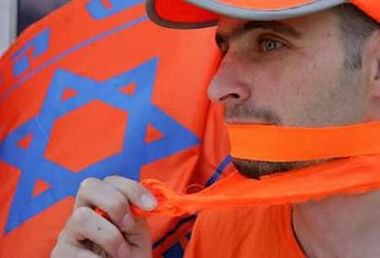|
Firm on Gaza pullout, Sharon confronts settlers
(Agencies)
Updated: 2005-07-06 08:31
Israeli Prime Minister Ariel Sharon on Tuesday confronted Jewish settlers due to be evacuated from the Gaza Strip, pledging to keep his pullout plan on track despite ultranationalist protests that have rocked Israel.
Attending a rare parliamentary roundtable, the ex-general appeared unruffled as settlers who once considered him their champion railed against the government's planning for their relocation as part of withdrawals set to begin in mid-August.
"To anyone who thinks disengagement will not be carried out because of this or that maneuver or motion, I say for the thousandth time disengagement will be carried out fully, as planned," Sharon said in nationally televised remarks.

An Israeli Right wing activist covers his mouth with orange ribbon, a symbol of Israel's anti-disengagement plan, front of a Jerusalem police station July 3, 2005. [Reuters] |
"It is permissible to demonstrate and protest, but we won't agree to highways being blocked, to the scattering of nails and oil (on roads) and to security personnel being beaten," he said.
"Whoever wants to make people suffer can try it," Sharon added while on a tour of Nitzan, a site north of the Israeli city of Ashkelon where temporary homes have been built to house evacuated settlers.
But, said Sharon, he has issued an "unequivocal" order not to permit any disruption of Israeli life."
The Israeli prime minister aims to evacuate all 21 Jewish settlements in Gaza, which is home to 1.3 million Palestinians, and four of 120 in the West Bank. U.S.-led mediators hope the disengagement will foster a "road map" peace process between Israel and Palestinians seeking statehood in occupied lands.
Palestinians welcome any Israeli withdrawals from lands occupied in the 1967 Middle East war. However, they accuse Sharon of planning to leave Gaza mainly in order to cement Israel's hold on much larger settlements in the West Bank.
Taking the microphone during a session marked by occasional heckling from rightist lawmakers, Naomi Eldar, a teacher from the main Gaza settlement bloc of Gush Katif, burst into tears as she described her community's disenchantment with Sharon.
"'Salt of the earth, I love you, you're dear to me', was what you told us, Mr. Prime Minister," Eldar said, to nods from dozens of other settler representatives in the audience. "This is how you treat people dear to you?"
APPEALS FOR DELAY
Eldar implored the prime minister to postpone the withdrawals "so that we might move while still sane, together, to one place, and so that the trauma will not be too great."
Polls show most Israelis back Sharon's bid to "disengage" from conflict with the Palestinians by quitting occupied Gaza and a corner of the West Bank. The support appears to have been buoyed by growing public exasperation at pro-settler protests.
But many rightists, including members of Sharon's Likud party, say the plan forsakes Jewish claims on biblical lands and rewards Palestinian violence.
"Many people wonder if a fateful decision of this magnitude was made with full forethought and deliberation," said parliamentary speaker Reuven Rivlin, who is against the pullout.
Sharon has rejected proposals for delaying the pullout as stalling tactics.
As the discussion turned to military preparations, Sharon reiterated a threat to hit back hard if Palestinian militants attack soldiers and settlers during the pullout. The Palestinian Authority has pledged to keep armed groups in check.
"If there is fire during the evacuation, our response will be very tough. The reactions could be so tough as to undermine the whole process," Sharon said, apparently referring to efforts to revive a stalled U.S.-led peace "road map."
"When I said there will not be evacuation under fire, I did not mean there will not be an evacuation, but that there will not be fire," he said.
Israeli Defense Minister Shaul Mofaz told lawmakers that 41,000 soldiers and 3,800 police would be on hand to carry out the withdrawal.
In a separate development, Israel's High Court barred Jewish settlers from moving into a West Bank outpost not authorized by Israel near the town of Ramallah, said a spokesman for Israel's Peace Now group who had appealed the case.
Israel has pledged to remove some 105 outposts built without government permission but has balked at removing any before the Gaza pullout.
Israel Radio reported that Israel and the Palestinian Authority had reached agreement in principle on creation of an overland link between Gaza and the West Bank after the pullout.
|